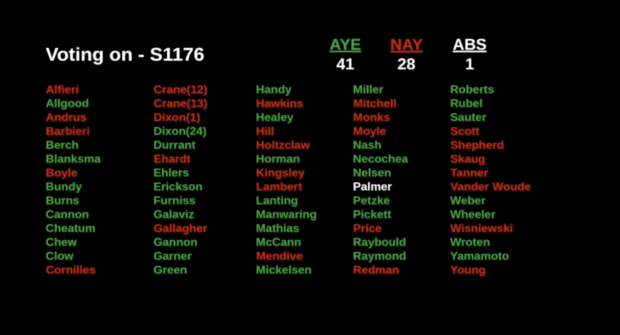After 45 minutes of raucous debate, the House passed a higher education budget late Thursday afternoon.
The debate — and lawmakers’ questions — barely touched on the numbers in Senate Bill 1176, a $678.5 million spending plan for the state’s four four-year institutions. Instead, opponents focused their ire and frustration at diversity, equity and inclusion programs on the campuses.
“I am sick and tired of saying, ‘Quit going down this path of DEI,’” said Rep. Brent Crane, R-Nampa, singling out ongoing programs at Boise State University. “No means no, stop means stop.”
“Are you willing to say no to higher ed today to send a message?” said Barbara Ehardt, R-Idaho Falls, who labeled DEI programs as “woke.”
In a way, the higher education budget does say no to the programs in question, by taking taxpayer dollars out of the equation.
“The college and universities shall verify no state-appropriated funds are used to support diversity, equity, inclusion, or social justice ideology as part of any student activities, clubs, events, or organizations on campus,” the bill states.
Coming to the bill’s defense, members of the budget-writing Joint Finance-Appropriations Committee pointed to the language, which also requires the schools to report to the 2024 Legislature on their DEI spending.
“We provided direction,” said Rep. Britt Raybould, R-Rexburg. “The universities have complied. We are auditing them. We are managing this process.”
JFAC co-chair Wendy Horman gave an assignment to her colleagues. If lawmakers are serious about stamping out DEI programs, she said, they can follow the lead of other states and simply propose an outright prohibition, regardless of funding source.
“I think the universities are open to that at this point,” said Horman, R-Idaho Falls. “If we want to set the policy, let’s set the policy.”
But another JFAC member, Rep. Matthew Bundy, offered a defense of academic freedom. The campus needs to remain “a laboratory of thought,” said Bundy, a high school teacher who has also worked as a college adjunct professor.
“Not just certain ideas, but all ideas,” said Bundy, R-Mountain Home.
The budget passed on a 41-28 vote.
 SB 1176 parcels out money from two main funding sources: student tuition and fees and state general fund tax dollars.
SB 1176 parcels out money from two main funding sources: student tuition and fees and state general fund tax dollars.
The four schools would receive $353.9 million from the general fund, a 4.7% increase.
The spending increases would vary by institution, said Rep. James Petzke, R-Meridian, the budget bill’s floor sponsor. Idaho State University would receive a 7% increase; the University of Idaho would receive a 6.9% increase; Lewis-Clark State College would receive a 4.1% increase; and Boise State would get an additional 4%.
The higher ed budget adheres closely to Gov. Brad Little’s spending recommendation from January. The budget, which passed the Senate Tuesday, now goes to the governor’s desk.
Thursday’s higher ed House vote is a milestone, as lawmakers hope to adjourn the 2023 legislative session by the end of this week.
But several education issues remain on the to-do list.
Neither house has passed the K-12 budgets — a series of seven spending bills that have not yet surfaced.
The House still needs to take up a bill that reworks Idaho Launch, Gov. Brad Little’s in-demand careers proposal. The Senate Wednesday passed a pair of bills creating the postsecondary incentives plan, but one bill still needs the House’s endorsement.
And among other issues still at play: a hot-button bill banning harmful materials in public libraries and school libraries. The Senate State Affairs Committee sent one bill to the floor for possible amendments Wednesday. The committee has two related bills on its agenda for Friday morning.
The Senate remained in session Thursday evening, and is expected to remain on the floor until about 7 p.m. The House adjourned late Thursday afternoon, after passing the higher education budget.
Department of Education budget
The K-12 budgets haven’t shown up yet, but the House did approve a spending bill for state superintendent Debbie Critchfield’s State Department of Education.
The department would receive nearly $14.8 million in state general fund tax dollars, a 4.4% increase.
The budget also would fund several new hires in the SDE, including a full-time staffer focused on dyslexia services, a full-time workforce development coordinator, a half-time school choice coordinator and a half-time parental engagement coordinator.
House Bill 353 passed on a 50-17 vote, and heads to the Senate.
Rural CTE funding
The House also approved $50 million to expand career-technical education.
The spending bill is an add-on to House Bill 267, which is designed to start up costly CTE programs, particularly in rural Idaho. The one-time money would come from the state’s new in-demand career fund, created in September.
The budget passed on a 41-23 vote, and heads to the Senate.
